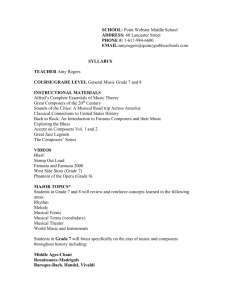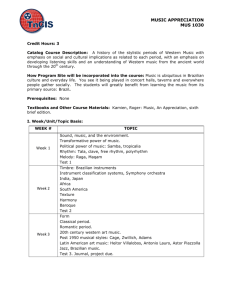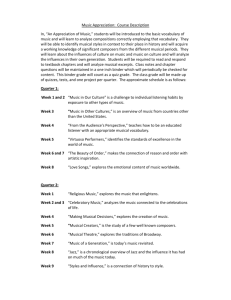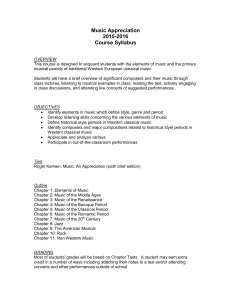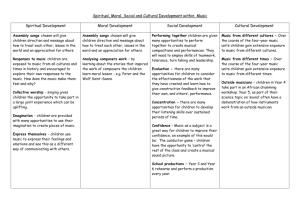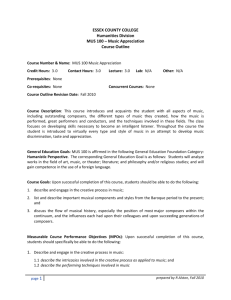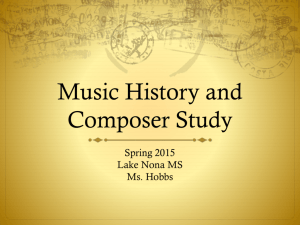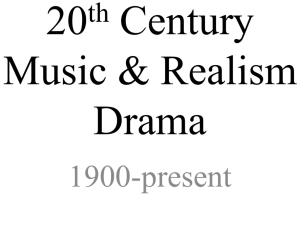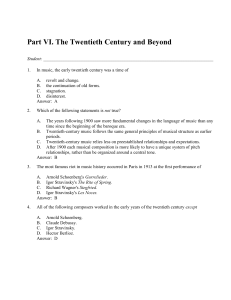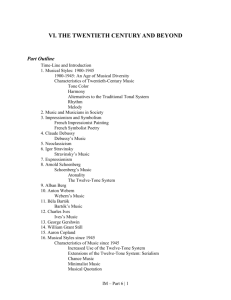Music History IV—Dr
advertisement
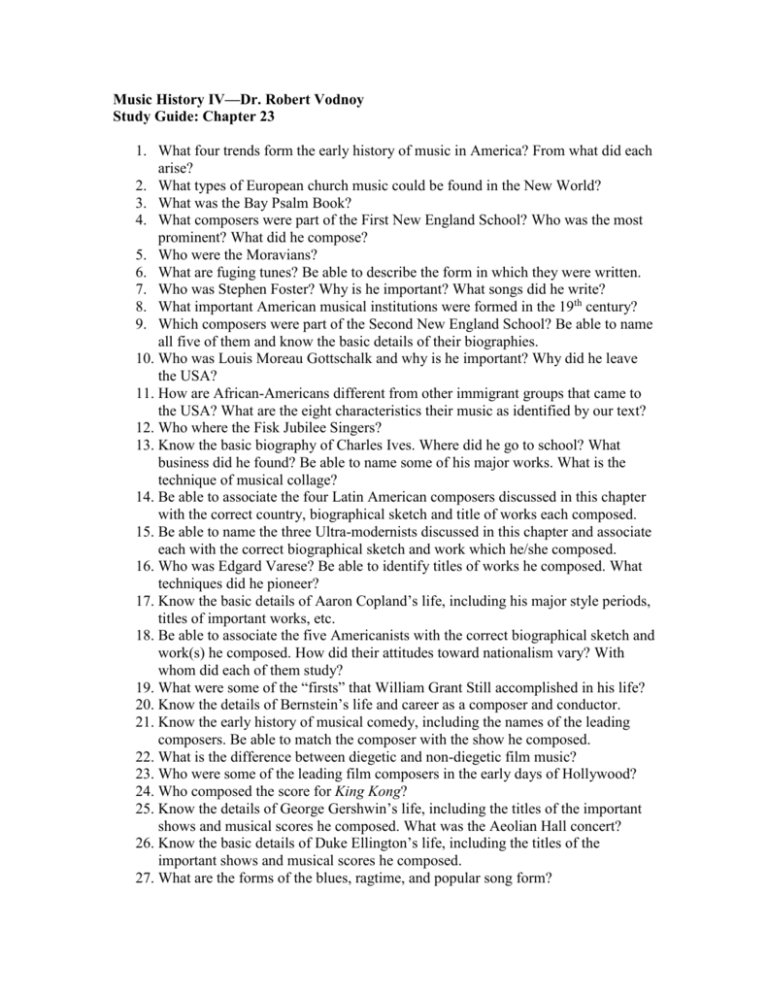
Music History IV—Dr. Robert Vodnoy Study Guide: Chapter 23 1. What four trends form the early history of music in America? From what did each arise? 2. What types of European church music could be found in the New World? 3. What was the Bay Psalm Book? 4. What composers were part of the First New England School? Who was the most prominent? What did he compose? 5. Who were the Moravians? 6. What are fuging tunes? Be able to describe the form in which they were written. 7. Who was Stephen Foster? Why is he important? What songs did he write? 8. What important American musical institutions were formed in the 19th century? 9. Which composers were part of the Second New England School? Be able to name all five of them and know the basic details of their biographies. 10. Who was Louis Moreau Gottschalk and why is he important? Why did he leave the USA? 11. How are African-Americans different from other immigrant groups that came to the USA? What are the eight characteristics their music as identified by our text? 12. Who where the Fisk Jubilee Singers? 13. Know the basic biography of Charles Ives. Where did he go to school? What business did he found? Be able to name some of his major works. What is the technique of musical collage? 14. Be able to associate the four Latin American composers discussed in this chapter with the correct country, biographical sketch and title of works each composed. 15. Be able to name the three Ultra-modernists discussed in this chapter and associate each with the correct biographical sketch and work which he/she composed. 16. Who was Edgard Varese? Be able to identify titles of works he composed. What techniques did he pioneer? 17. Know the basic details of Aaron Copland’s life, including his major style periods, titles of important works, etc. 18. Be able to associate the five Americanists with the correct biographical sketch and work(s) he composed. How did their attitudes toward nationalism vary? With whom did each of them study? 19. What were some of the “firsts” that William Grant Still accomplished in his life? 20. Know the details of Bernstein’s life and career as a composer and conductor. 21. Know the early history of musical comedy, including the names of the leading composers. Be able to match the composer with the show he composed. 22. What is the difference between diegetic and non-diegetic film music? 23. Who were some of the leading film composers in the early days of Hollywood? 24. Who composed the score for King Kong? 25. Know the details of George Gershwin’s life, including the titles of the important shows and musical scores he composed. What was the Aeolian Hall concert? 26. Know the basic details of Duke Ellington’s life, including the titles of the important shows and musical scores he composed. 27. What are the forms of the blues, ragtime, and popular song form? 28. Know the basic history of jazz, including eight styles of jazz. Be able to match the composers/performers to the correct style (Ragtime, Dixieland, Blues, New Orleans Jazz, Big Bands, Swing, Bebop, Post-Bebop, Free Jazz): Louis Armstrong Dave Brubeck Ornette Colman John Coltrane Miles Davis Duke Ellington George Gershwin Dizzy Gillespie W. C. Handy Fletcher Henderson Scott Joplin Jelly Roll Morton King Oliver Charlie Parker Bessie Smith 29. Who were the following people? With what composer or musical style were they most closely associated? Nadia Boulanger Elliot Carter Bessie Smith W.C. Handy Jelly Roll Morton Carl Sandberg Gertrude Stein Paul Whiteman 30. Who wrote the following musical works? Afro-American Symphony American in Paris Amériques Applachian Spring Bachianas Brasileiras No. 5 Back Water Blues Birth of the Cool Camptown Races Chorôs No. 14 Concord Sonata Dance Symphony El Salon Mexico Fanfare for the Common Man Four Saints in Three Acts Gaelic Symphony General William Booth Enters Heaven Harlem Hora novissima Ionization Jeannie with the Light Brown Hair Jubilee and Noël Lady Be Good Lincoln Portrait Little Johnny Jones Maple Leaf Rag Merry Mount The Mother of Us All Of Thee I Sing Oklahoma Poéme electronique Rhapsody in Blue The Red Pony Rip Van Winkle Overture Rodeo Romantic Symphony Sensemayâ Showboat Sinfonia India Souvenir de Porto Rico Strike Up the Band The Tides of Manaunaum Treemonisha Trouble in Tahiti Unanswered Question Variaciones concertantes Wonderful Town Take-home question: Write a brief description and musical analysis of one of the following works and relate it to the composer’s work as a whole. All works can be found in the anthology and on the CD which accompanies our text. Beech: Piano Quintet Ives: “General William Booth Enters Heaven” or “Three Places in New England” (“General Booth” is on the CD, “Three Places” is on Naxos) Revueltas: Sensemayâ Crawford: String Quartet Grant: Afro-American Symphony Copland: Appalachian Spring
